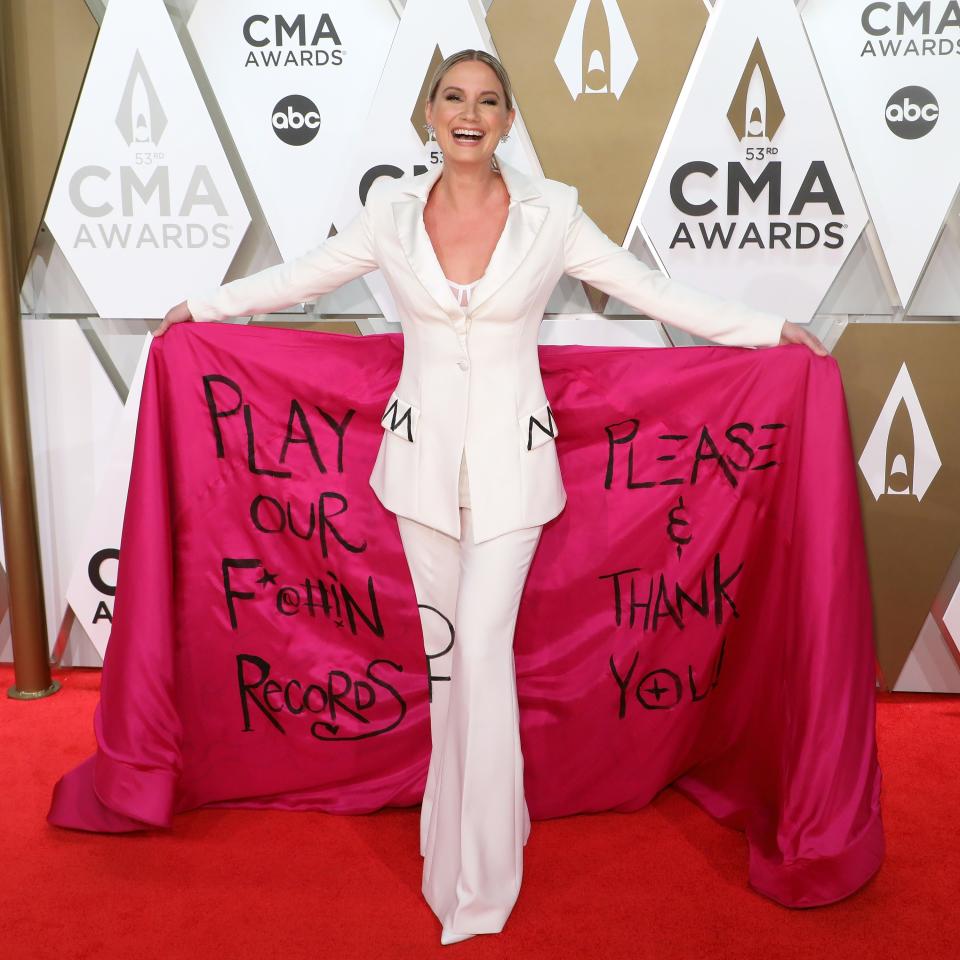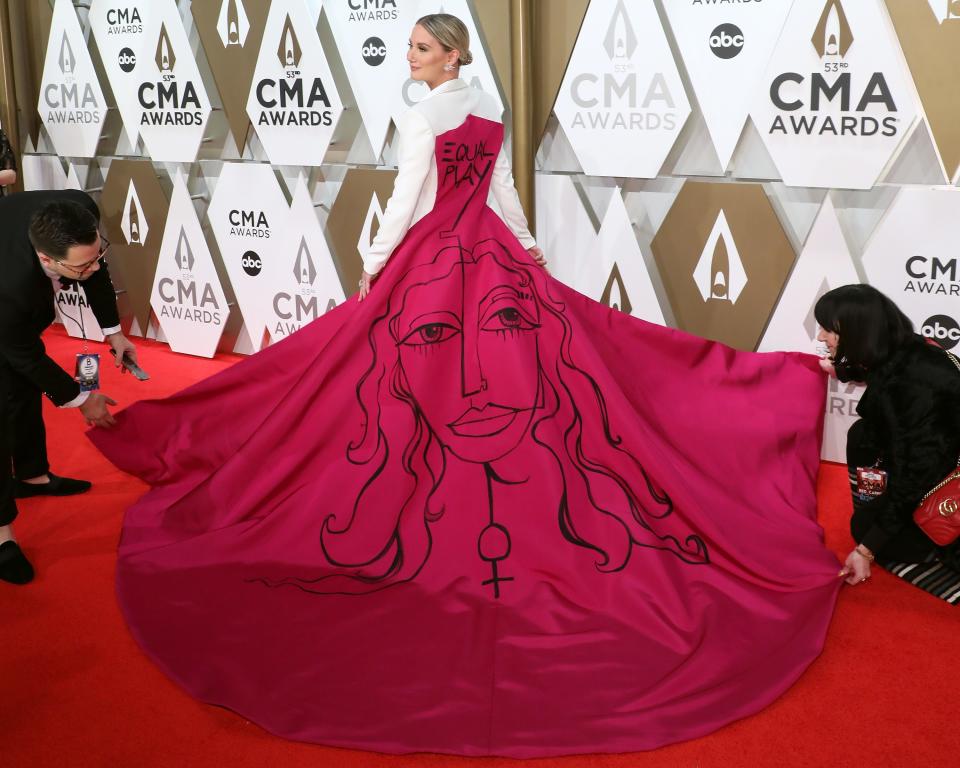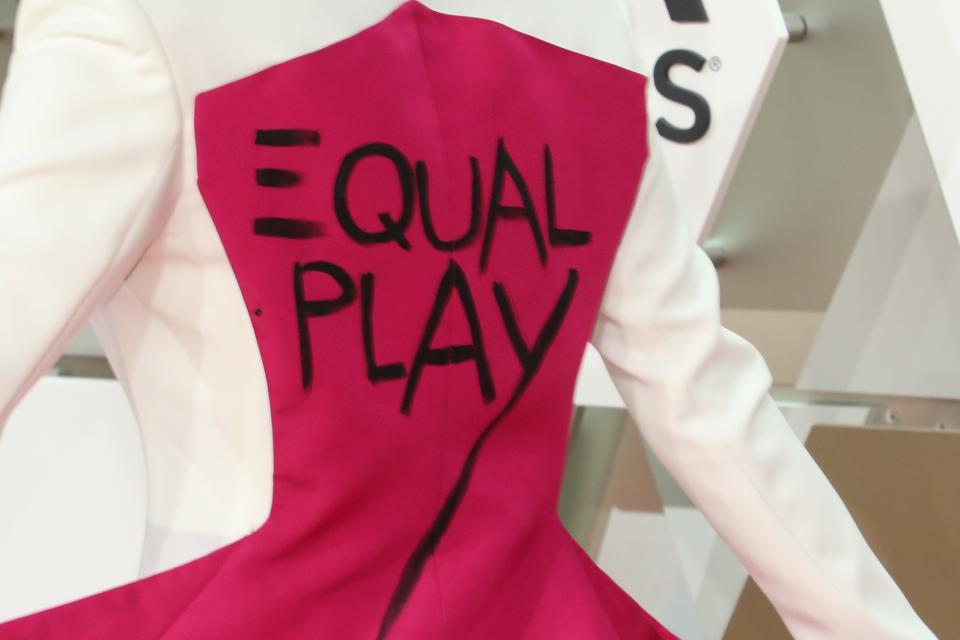Jennifer Nettles Doesn’t Just Want Equal Pay in Country Music—She Wants Equal Play
In November 2019, country singer Jennifer Nettles wore an outfit to the 2019 CMA Awards that shined a light on the radio play disparity between male and female country artists. She paired her outfit with a hashtag, #EqualPlay, that's steadily popping up all over social media. Below, Nettles explains in her own words how that now-iconic red-carpet outfit came together—and why #EqualPlay should matter to everyone, not just musicians.
When I was invited to be a part of the CMAs in November 2019, I learned that the opener was going to be a showcase of women in country music throughout the decades, and the show itself was going to honor and celebrate women and have three female hosts. I thought, “Wow, this is really fantastic.” I also thought, “What an opportunity to take the conversation beyond the applause—to make sure the evening isn’t just some sort of ritual.” I hoped it wasn’t going to just check a box and say, “Look at how much we support women in country music!”
Because both research and observation illustrate that isn’t the reality.
So I had a spark of inspiration: I wanted to make a “statement” on the red carpet. And what’s a more womanly way to make a statement than through fashion? In a way, it’s turning the weapon on its head—so many times when people speak of women, it’s all about their beauty, all about the outside. Well then, I figured, I’ll use the outside as a tool for expression.
I knew exactly what I wanted to say. I wanted to get people’s attention and point a cheeky, subversive finger at the truth. When I say it was a spark of inspiration, it was a spark of inspiration. Like any creation—writing a song, for example—this came to me. I wanted simply to say, “Play our fucking records, please and thank you.” (“Please and thank you” to be mannerly, of course.) But I knew that if I actually used the expletive, media outlets might veer away from picking up the pictures. So I thought, If I make it more cartoonish, if I use symbols for the letters, everybody will know what it means and it will be more effectively digested.

The 53rd Annual CMA Awards - Arrivals
Getty ImagesMy stylist, Haley Atkin, reached out to Christian Siriano. I’ve worked with him several times, and he is a fantastic advocate, ally, and activist for equality across the board. He was into the idea and created this beautiful design: a suit with a gorgeous cape train that flowed behind it. I thought it was a wonderful mixture of strength and femininity at the same time. And then Haley found Alice Mizrachi, a visual artist, muralist, street artist, and portraitist in New York. We spoke and I shared with her my vision, what I wanted it to say, and how I wanted it to look.
And then came the night of the CMAs, and I thought, “Well, let’s see how this goes.” When I stepped out on the red carpet and made the reveal, there was this collective gasp and giggle at the same time. I thought, Yeah, this is going to work; this is going to do exactly what I wanted it to do. It was an opening up of a conversation for the whole rest of the red carpet. And now it’s blossomed even further in such a beautiful way.

The 53rd Annual CMA Awards - Arrivals
Getty ImagesThere’s been a ton of press pick-up, including the New York Times. People kind of knew there was a disparity in country music. But I think when you look at the actual statistical information behind it, when you really understand those numbers, it’s staggering. The Annenberg Inclusion Initiative did a study and found that of the top 500 charted country songs from 2014 to 2018, only 16% were by female artists.
That is tragic. Those numbers reveal a truth that artists share and lament over but haven’t had the actual research to back up until now. I want to continue the conversation, on both a corporate level and a programming level, because it needs to change. It is beautiful how one spark can set aflame—hopefully—a movement. I’m calling it #EqualPlay to underscore equal pay, because it’s the same gender pay gap that’s happening across so many industries and in our culture at large.
For women in country music, what happens is that even out of that 16% who are being played, the average female is 29 years old. For men, the average mean age in that group is 42. That says a lot about what we value socially—the pressures that are put on women in terms of ageism and beauty. It also tells me that women aren’t offered the same support to be able to continue their careers. If you’re working in the music business, your life is very much dependent on travel. Touring is really the only way to make a living anymore. So if you’re a working mother who doesn't have the resources to support your family and take your child with you, you’re suddenly presented with a high-stakes proposition: Am I going to be gone for months at a time without seeing my child? If that’s a no, you’re forced to choose. This is just a microcosm of the same challenges women feel all over this country in terms of the lack of support where working moms and childcare are concerned.

The 53rd Annual CMA Awards - Arrivals
Getty ImagesOne way I’m hoping to evoke change is through my partnership with Secret Deodorant. They have a fantastic initiative they launched with the nonprofit Women in Music that’s aimed at supporting females in the industry. In addition to using women composers for their ads, Secret will provide 250 women with memberships to Women in Music, which offers mentorship and access to industry events, and one woman will have her music featured in a commercial.
Something else I want to shed a light on: how big data is affecting—and not necessarily for the better—our culture. Radio programming is based on algorithms, which is basically a bias set to numbers. You can go in and code for diversity and equality, but you have to care enough to do it. An example of this at play: When big data really started to become a part of the country music industry, there was this “bro country” trend that created a bias toward male artists. I would have loved if big data had come in during a time when women were really celebrated—when we had Faith Hill, Martina McBride, and Shania Twain topping the charts. People use these algorithms to justify their own systems of belief rather than analyze the truth. They look at the numbers and say, “Well, people turn the channel whenever they hear a woman sing.” No. They turn the channel when they don’t hear something they recognize, because people have an inherent bias toward familiarity. People don’t have familiarity with women on country radio because they’re not played. If they were familiar with the song, they’d like it! If you just played it more, it would fix the problem. But therein lies the challenge.
This is happening everywhere—in the loan industry, in job hunting. If you have an algorithm that programs for who’s the best loan candidate, and it fits a profile for a white male, you’re not going to get a home loan if you don’t check enough boxes to fit that profile. The same thing goes for trying to get a job. If you don’t fit the profile for what would be a CEO, the majority of which in our country has been white men, you’re going to stand less of a chance to get that job if they’re using any sort of data collection in their selection process.
The good news: The music industry is way sexier than loans. (My own personal, biased opinion, of course.) So I hope that bringing attention to this will create an impact—a culture that will allow space for transparency and questioning and to actually change these programs that continue to exclude people. Big data continues to be derivative of a past that isn't indicative of what we want our future to be. I’m starting with music, but it’s a bigger issue—one that will absolutely affect the lives of every individual in this country.
Jennifer Nettles is a Grammy Award–winning country artist. Follow her on Twitter @JenniferNettles.
Originally Appeared on Glamour

